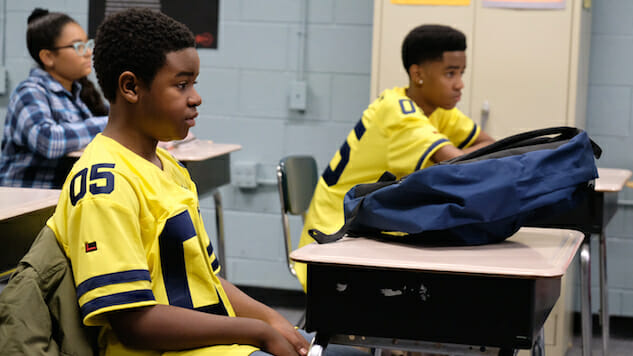Atlanta Gives Us a Dark, Revealing Flashback
(Episode 2.10)
Photo: Curtis Baker/FX
Atlanta’s second season has been ambitious in the extreme, teaching its lessons in one-offs that separate its characters and genres that don’t bend so much as become multi-hyphenates. Its first all-flashback episode is just as dark and just as revealing.
While the end of “North of the Border” proved that Earn (Donald Glover) and Paper Boi’s (Brian Tyree Henry) personal and professional relationship had its back broken by a spilled drink at a shitty gig, “FUBU” explains how that particular camel started its trek through the desert. It’s the second episode Donald Glover’s directed this season, from a script by his brother, Stephen—so, of course, it’s about family.
It’s time for a trip down memory lane. Alfred and Earn go back to school. ROTC and Marshall’s clothes, science labs and substitute teacher cruelty. Somehow the protagonists seem the same. That’s because the casting is impeccable and the performances are a joy. Little Earn (Alkoya Brunson) and side-eyein’ Little Alfred (Abraham Clinkscales) walk that perfect line between recognizable performance and outsized impression, especially in Brunson’s delivery style, that makes the flashback work. That and the single-line roast/love of Dragon Ball Z. Its moments—delicately crafted by the Glovers with poetic scenes and shots so nostalgic they threaten to start your own flashbacks—are satisfyingly minute and mundane. That is, they would be if they didn’t happen to you. But some version did.
The classroom experience, whether it’s fighting over who’s really wearing fake fashion (where white boys with swoopy blonde hair definitely don’t get the struggles of the black dork) or lingering looks at every cute girl that talks to Little Earn, revels in detailed empathy for its kids. It’s reminiscent of The Wire’s exquisite fourth season, where a middle school friend group is analyzed on and off of the Baltimore corners, only we’re not here to use these kids as piñatas, picking lessons off the ground after the show beats the hell out of them. We’re here to observe the lower-middle-class suburbs in action, no heavy social lessons needed. Even if some are warranted.
The episode is a trip into the burning engines of inadequacy that have been driving these characters for a long while. Alfred is a born hustler, while Earn has sought external approval for so long he’s probably got that extra stripe from his bootleg FUBU burned into his soul like a scarlet letter. That middle schooler entitlement, where you’re the center of the social solar system in your geocentric self-perception, never went away for Earn. And the opposite, the martyred savior complex Alfred built after saving his cousin’s ass over and over again, has only just begun to chip away in the present. And the kid that had the “fake” fashion? He was bullied into suicide because of chance, cruelty, and (tangentially) the familial bond of Alfred and Earn. Their relationship has had blood on its hands for a long time.
That twist isn’t unexpected, especially if you’ve been watching this season dive headfirst into the dour deep end, but it’s handled well with a detached sadness that is very meaningfully shot through the hazy grime of a school bus window. It’s an arbitrary chain of events that result in a total breakdown. For Earn, who’s been diagnosed by fans since Season One with various mental illnesses, the same process is threatening to repeat itself in the present.
The expectations thrust upon the schoolkids—making good first impressions, caring about their clothes, sticking up for their families—are all sound, but have the same scent of hypocrisy that they do in adulthood. Some of that can be put on society, sure. Kids are cruel and this specific cruelty was levied against someone who just couldn’t take it. The rap business is dog-eat-dog and family bonds can only go so far. But failing to recognize the players in this game is missing the series’ key. Earn and Alfred’s problems—failing to take responsibility, take earned lumps, or earn self-respect—only exacerbate systemic problems. You can say only bullying killed that kid or that the rap business only takes the most ruthless. But doing so damns Earn and Alfred to their fate, just like their blood.
Jacob Oller is a writer and film critic whose writing has appeared in The Guardian, Playboy, Roger Ebert, Film School Rejects, Chicagoist, Vague Visages, and other publications. He lives in Chicago, plays Dungeons and Dragons, and struggles not to kill his two cats daily. You can follow him on Twitter here: @jacoboller.







































